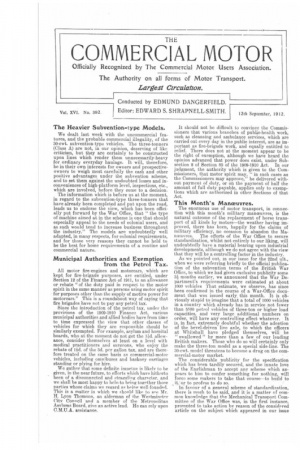Municipal Authorities and Exemption from the Petrol Tax.
Page 1

If you've noticed an error in this article please click here to report it so we can fix it.
All motor fire-engines and motorcars, which are kept for fire-brigade purposes, are entitled, under Section 12 of the Finance Act of 1911, to an allowance or rebate " of the duty paid in respect to the motor spirit in the same manner as persons using motor spirit for purposes other than the supply of motive power for motorcars." This is a roundabout way of saying that fire brigades have not to pay any petrol tax.
Since the introduction of the petrol tax, under the provisions of the 1909-1910 Finance Act, various municipal authorities and allied bodies have from time to time expressed the view that other classes of vehicles for which they are responsible should be similarly exempted. For example, asylum and hospital boards, who at the moment do not get the lid. allowance, consider themselves at least on a level with medical practitioners and surgeons, who enjoy the rebate of Id. of the 3d. per gallon tax, and are therefore treated on the same basis as commercial-motor vehicles, including omnibuses and hackney carriages standing or plying for hire.
We gather that some definite impetus is likely to be given, in the near future, to efforts which have hitherto been of a disconnected and straggling charscter. and we shall be most happy to beln to bring together those parties whose claims we regard as being well-founded. This is a matter in which we should like to see Mr. H. Lyon Thomson, an alderman of the Westminster City Council and a member of the Metronolitan Asylums Board, give an active lead. He can rely upon C.M.U.A. assistance. It should not be difficie t to convince the Commissioners that various branches of public-health work, such as cleansing and ambulance services, which are carried out every day in the public interest, are as important an fire-brigade work, and equally entitled to relief. There does not at the moment appear to be the right of exemption, although we have heard the opinion advanced that power does exist, under Subsection 2 of Section 85 of the 1909-1910 Act. In our judgment, the authority which is given to the Commissioners, that motor spirit may, in such cases as the Commissioners may approve," be delivered without payment of duty, or on the payment of half the amount of full duty payable, applies only to exemptions which are authorized in other Sections of that Act.




















